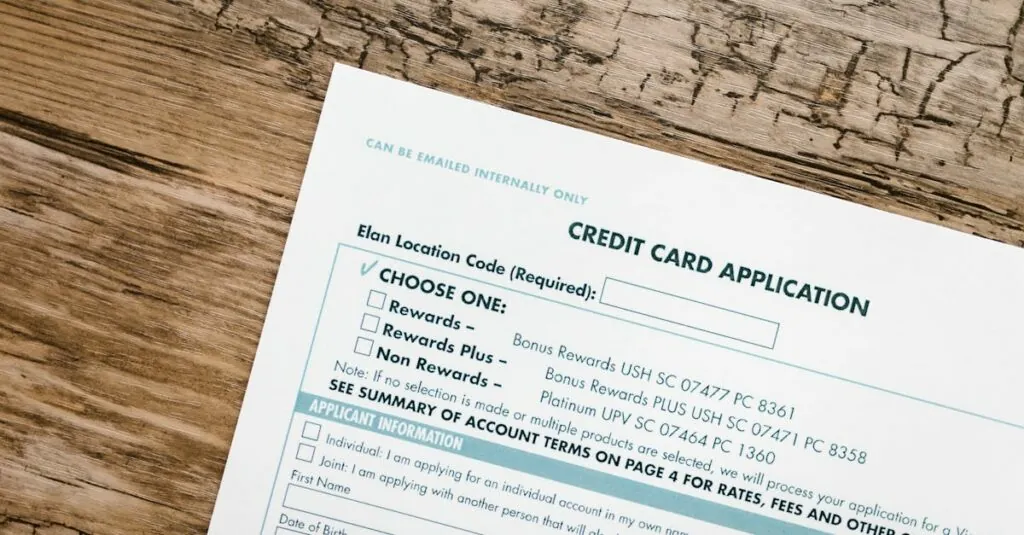Table of Contents
ToggleNavigating the world of home loans can feel like trying to find a needle in a haystack—blindfolded. But fear not, the FHA loan application is here to save the day, offering a lifeline for first-time homebuyers and those looking to refinance. With lower down payment requirements and flexible credit guidelines, it’s like finding a treasure map that leads straight to your dream home.
Overview Of FHA Loan Applications
FHA loan applications provide a pathway for individuals and families to secure financing for purchasing homes. These loans cater to various financial situations, making them a preferred choice for many buyers.
What Is An FHA Loan?
An FHA loan is a mortgage insured by the Federal Housing Administration. This type of loan aims to encourage homeownership by offering lower down payment options and more lenient credit requirements. Borrowers can access financing with a down payment as low as 3.5% if they have a credit score of 580 or higher. Those with credit scores between 500 and 579 can still qualify but must provide a 10% down payment. FHA loans are particularly beneficial for first-time homebuyers or those with less-than-perfect credit histories.
Benefits Of FHA Loans
FHA loans offer several key advantages for borrowers. Lower down payments make home purchases feasible for many who might struggle to save larger amounts. Competitive interest rates often result in lower monthly payments. Additionally, FHA loans permit higher debt-to-income ratios, allowing more individuals to qualify. Mortgage insurance premiums, while necessary, can be more affordable than conventional loans, increasing overall affordability. Homebuyers appreciate the streamlined refinancing options that FHA loans provide, facilitating ease of financial transitions.
Eligibility Requirements
Eligibility for FHA loans depends on several key factors. Understanding these requirements helps prospective borrowers assess their qualifications.
Credit Score Criteria
FHA loans require a minimum credit score of 580 for a down payment of 3.5%. Borrowers with scores between 500 and 579 may qualify with a down payment of 10%. Credit scores determine loan terms, so higher scores often lead to better interest rates. Lenders may consider extenuating circumstances that explain lower scores. Consistent payment histories and recent financial activities can influence approval decisions.
Income and Employment Verification
Stable income is essential when applying for an FHA loan. Lenders typically seek proof of steady employment over the past two years. Valid sources of income include salaries, bonuses, and commissions. Self-employed individuals must provide additional documents, such as tax returns and profit-loss statements. These verification measures ensure that borrowers can meet monthly mortgage obligations and maintain financial stability.
The FHA Loan Application Process
The FHA loan application process involves specific steps and necessary documentation. Navigating this process ensures a smooth experience for potential homeowners.
Step-By-Step Application Guide
Begin by choosing an approved FHA lender. Lenders provide various options, including online applications and in-person consultations. Complete the application form, which includes personal and financial details. After submitting the application, lenders conduct a credit check to evaluate eligibility. Provide additional information as needed, such as proof of income and asset verification. Once approved, the lender issues a loan estimate, detailing terms and costs. After reviewing the estimate, borrowers can accept the terms. Finally, proceed to closing, where the funds are allocated for home purchase.
Necessary Documentation
Prepare essential documents to facilitate the application. Gather recent pay stubs, tax returns, and W-2 forms to verify income. Collect bank statements to show available assets and savings. Include documentation for any additional income sources, like bonuses or side jobs. Lenders often require proof of employment, typically for the past two years. Submit documentation verifying identity, such as a government-issued ID. Self-employed individuals need to present business tax returns and profit-loss statements. Having these documents ready accelerates the approval process.
Common Challenges Faced
Navigating the FHA loan application process presents several challenges for potential homeowners. Understanding these obstacles helps in preparing for a successful application.
Issues with Credit History
Credit history poses significant challenges for many applicants. Lenders assess credit scores, with a minimum score of 580 required for the favorable 3.5% down payment option. Borrowers with scores between 500 and 579 face higher down payment requirements that reach 10%. Inconsistencies in credit reports can lead to misunderstandings during the process. Individuals must address any discrepancies promptly to avoid delays. Demonstrating reliable payment behavior over time can enhance approval chances. Applicants often need to show documentation explaining any negative marks, further complicating the application if issues arise.
Understanding Debt-to-Income Ratios
Debt-to-income (DTI) ratios serve as a crucial metric for lenders evaluating borrowers’ financial health. The ideal DTI ratio for FHA loans generally should not exceed 43%, although exceptions exist. Calculating this ratio involves comparing monthly debt payments to gross monthly income. High DTI ratios indicate potential financial strain, raising red flags for lenders. Applicants should prioritize reducing debt before applying to improve their DTI. Additionally, maintaining a steady income stream helps bolster application strength. Even with certain flexibility in these ratios, borrowers face scrutiny for exceeding limits, emphasizing the importance of financial planning.
Navigating the FHA loan application process can be a significant step toward homeownership. With its flexible credit requirements and lower down payment options, FHA loans cater to a wide range of financial situations. Borrowers who understand the eligibility criteria and prepare the necessary documentation are better positioned for success.
By addressing common challenges and maintaining a strong financial profile, they can enhance their chances of approval. Ultimately, FHA loans provide a valuable opportunity for first-time homebuyers and those looking to refinance, making the dream of homeownership more attainable.







